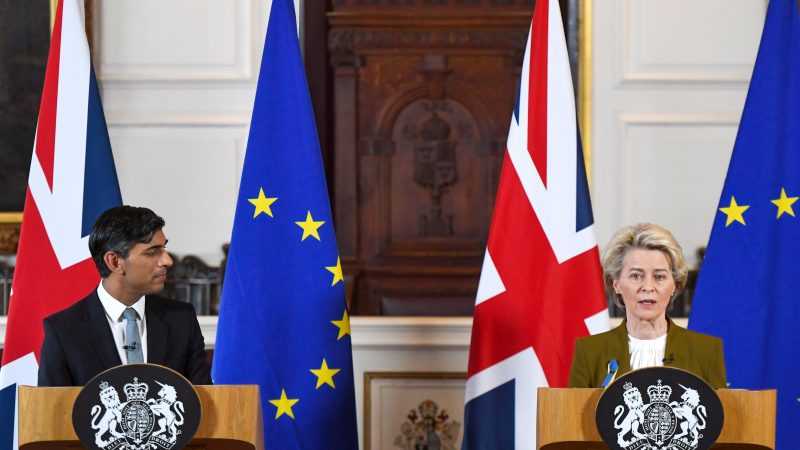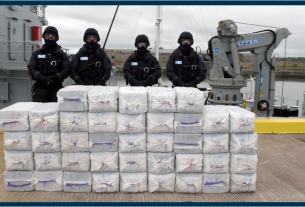EU and UK leaders have hailed a “decisive breakthrough” that will overhaul the controversial Northern Ireland protocol and herald a “new chapter” of relations between London and Brussels.
At a joint press conference in Windsor, close to Windsor Palace, a residence of King Charles, Prime Minister Rishi Sunak said that the deal was a “decisive breakthrough” that “safeguards sovereignty for Northern Ireland” and had removed “any sense of a border in the Irish sea”.
European Commission President Ursula von der Leyen said that the agreement would mark a “new chapter” with the EU and UK “standing shoulder to shoulder, now into the future”.
Under the so-called ‘Windsor Framework’, agreed upon on Monday (27 February) after almost two years of negotiations, the two sides have agreed that goods travelling from Britain will not face customs checks if they are staying in Northern Ireland and would go through a ‘green lane’.
Scrapping customs checks on goods staying within the UK was one of the main demands of London, although the details on how businesses would be qualified as ‘trusted traders’ remain to be seen.
Meanwhile, products which are going to be moved across the border into the Republic of Ireland would be subject to a ‘red lane’ and customs checks.
Elsewhere, in another concession to London, the deal will see the UK retaking tax powers that will allow rules on VAT, state aid and excise to be applied in Northern Ireland.
Meanwhile, the introduction of a new ‘Stormont brake’ could, in theory, allow members of the Northern Ireland assembly to prevent new EU single market laws from being applied in Northern Ireland.
Where the UK has failed to make headway is in the role of the European Court of Justice, which will continue to be the final arbiter on the application of EU law in Northern Ireland.
On medicines, meanwhile, the agreement provides that drugs approved by the UK’s medicines regulator would also be made available in Northern Ireland.
Von der Leyen also confirmed that the agreement would finally unlock UK access to the €95.5 billion Horizon Europe research programme, promising that the EU would “immediately” start work on the UK’s association agreement.
The agreement is the first major diplomatic success of Sunak, who became Prime Minister in October last year following the chaotic ousting of Boris Johnson and the six-week Liz Truss government. The mood music and tone of the joint statement with von der Leyen, shortly before the Commission chief headed for afternoon tea with King Charles in Windsor Palace, was noticeably warmer and constructive than the combative approach taken by Johnson and Truss.
“This is the beginning of a new chapter in our partnership,” said von der Leyen.
Sunak now faces the twin challenge of securing support for his agreement from his Conservative party and the pro-British unionist community in Northern Ireland, particularly the Democratic Unionist Party (DUP).
Government officials have indicated that the UK parliament will have a chance to ‘express its view’, which could set the scene for a revolt for hard Brexiteers, potentially led by former premier and architect of Brexit, Boris Johnson. However, the opposition Labour party has indicated that it will support the agreement which should guarantee a large majority for Prime Minister Sunak.
Without the support of the DUP, however, there is no prospect of a return to a power-sharing government in Belfast.
Michelle O’Neill, the leader of Sinn Fein, the largest party in the Northern Ireland assembly, said that she “welcomed the fact that a deal had been done”.
For his part, DUP leader Jeffrey Donaldson stated that his party would “consider the detail and measure the deal against our seven tests”.
The Northern Ireland protocol bill, introduced by Sunak’s predecessor Liz Truss, and which would give ministers the power to unilaterally overturn provisions of the protocol, has also been abandoned by the Sunak government in a gesture of goodwill to the EU.
[Edited by Nathalie Weatherald]



